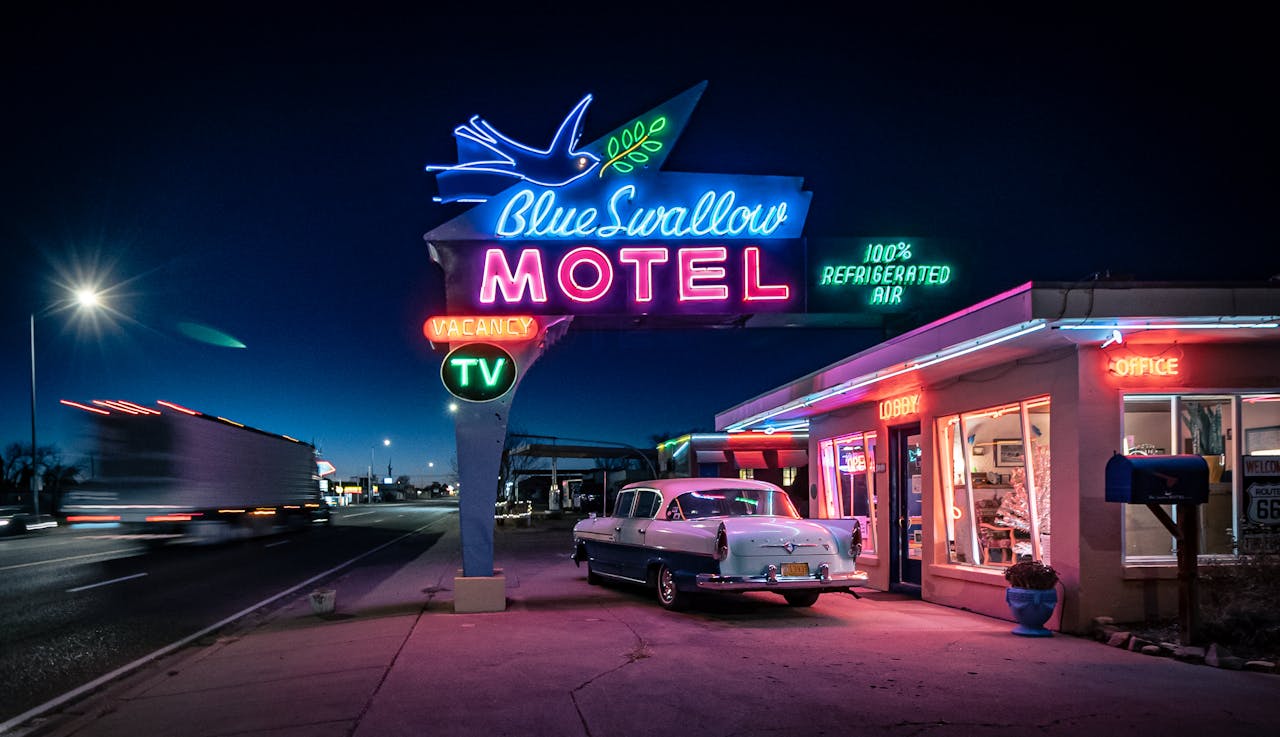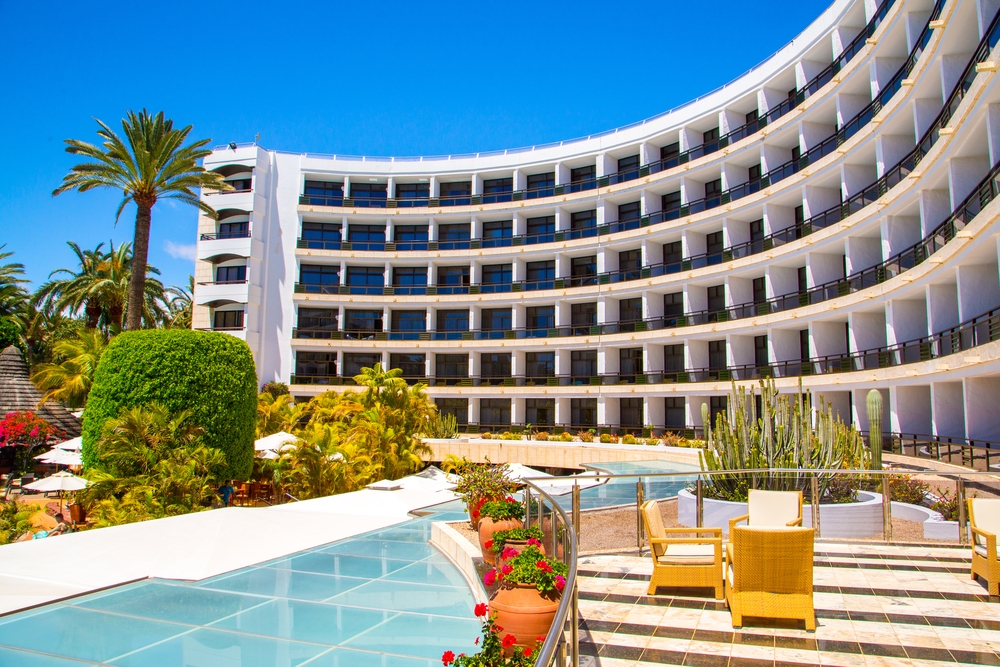Comparing Stays: The Difference Between Motel and Hotel Accommodations
By Hamza Benhlima · 29. April 2024
Trying to decide whether to stay at a hotel or motel?
In general, hotels and motels offer different experiences. Hotels typically have more amenities, while motels offer simple rooms and easy parking, perfect for quick stops on your road trip.
This article will help you make the best decision🤔 on hotel vs motel for your accommodation needs!
Key Takeaways
- Hotels offer a range of amenities including restaurants, gyms, and room service to meet various types of guests like business travellers and tourists, while providing comfort for longer stays.
- Motels are designed for motorists, offering basic accommodations with easy parking and room access, focusing on convenience for short-term or overnight stays.
- Deciding between a hotel and a motel is all about personal preferences and the nature of your trip.
Hotels: A Place of Many Amenities
 Woman Leaning on Handrail in a Hotel Room
Woman Leaning on Handrail in a Hotel Room
Hotels offer more than just a place to sleep. They are commercial establishments offering lodging, meals, and a variety of amenities to travellers and tourists.
As a significant part of the hospitality industry, hotels often feature common areas designed for relaxation, work, and entertainment.
Additionally, conference hotels offer an advantage for business travellers by offering dedicated meeting spaces and facilities.
Many hotels, particularly luxury ones in urban areas, go the extra mile to offer amenities such as:
- restaurants
- gyms
- panoramic views
- parking facilities
These amenities are part of what makes your stay in a hotel more than just accommodation.
Rooms and Luxury
Hotel rooms vary in size and style and cater to a wide range of guests. From standard single and double rooms to presidential suites, hotels offer different types of accommodation to meet different preferences.
Some hotels put a creative spin on their room categories with names like “Honeymoon Suite” or “Ocean View King”.
In addition, some rooms have special amenities such as smoking and non-smoking options, conference rooms and interconnecting rooms ideal for group travel, providing extra convenience for guests.
Services at Your Fingertips
 Person Checking Order From Hotel Room Service
Person Checking Order From Hotel Room Service
A great hotel stands out with its round-the-clock services, such as 24-hour concierge assistance and room service, ensuring guests are taken care of at any hour.
Imagine waking up to a delicious breakfast delivered straight to your room, or finding a tempting buffet spread waiting for you in the dining area.
These are just a few of the breakfast options available at hotels. Plus, there are regular housekeeping services to maintain cleanliness and comfort for guests.
Business and Pleasure
Whether you’re travelling for work or leisure, hotels have you covered. Business travellers can benefit from fast Wi-Fi📶 and business centres, ensuring a productive work experience even while on the go.
Leisure travellers, on the other hand, can take advantage of numerous amenities, like swimming pools and spas, designed to provide relaxation and entertainment during their stay.
Motel Breakdown: Simplicity on the Road
 blue swallow motel
blue swallow motel
While hotels provide luxurious experiences, motels have their unique appeal. The term ‘motel’ originated in the 1920s, combining the words ‘motor’ and ‘hotel’, indicating that they were designed specifically for motorists.
Motels are typically one- or two-story buildings conveniently located along major highways, making them an ideal pit stop for tired travellers.
They offer essential accommodation without the frills often found in hotels, making them budget-friendly and focusing more on convenience than comfort.
Accessibility and Parking
One of the standout features of motels in their design that prioritises easy access. Motels generally have low buildings along highways, with rooms having direct outdoor access from the parking area.
This layout makes it easy to load and unload luggage and gives guests a sense of security as their vehicles can be parked right outside the rooms.
Fewer Frills, More Value
Motels put value first. Originally designed as an economical accommodation option for motorists, they offer fewer amenities and focus more on the essentials.
These no-frills accommodations are becoming increasingly popular because they offer savings on accommodation costs, allowing travellers to spend their budget elsewhere.
Key Differences Between Hotels and Motels
Although both hotels and motels offer accommodation, they differ in many ways.
Hotels are typically multi-story buildings with interior hallways, while motels are often one or two stories with room doors that open directly into the parking lot.
Hotels are designed to house guests for several days or weeks, while motels are intended for travellers who need an overnight stay.
Target Audience
In terms of target audience, hotels cater to a wide range of guests including business travellers, families, couples and groups.
Motels primarily cater to road trippers, long-distance drivers and budget travellers looking for a simple and affordable stay.
Ultimately, the choice between a hotel and a motel often comes down to the traveller’s needs, preferences and budget.
Amenities Spectrum
 Luxury hotel with pool and palms
Luxury hotel with pool and palms
Amenities play a crucial role in the difference between hotels and motels. Hotels generally offer a wider range of amenities, many of which are not typically available in motels.
Some common amenities found in hotels but not in motels include:
- Cocktail lounges
- Room service
- Spa services
Although motels offer fewer services than hotels and focus on basic amenities, some may have additional facilities such as swimming pools.
Accommodation Styles: Urban Hotel Offering Parking vs. Classic Motel Stay
The style of accommodation also varies considerably between city hotels and classic motels. City hotels have space issues, which can make parking options limited and potentially expensive.
Despite these challenges, some city hotels offer valet parking or have partnerships with local parking garages to accommodate guests with vehicles.
Motels, on the other hand, typically offer ample free parking directly in front of or near the rooms, meeting the needs of drivers.
Urban Convenience
City hotels often go to great lengths to accommodate guests with vehicles. Although space may be limited, they tackle this challenge by offering free parking or partnering with nearby parking garages.
However, these parking services may come at an additional cost, but they ensure that guests have a safe place to park their vehicles.
Roadside Ease
In contrast, motels are designed for easy parking. Thanks to their layout, guests can park their vehicles right outside their rooms, making it easier to load and unload luggage.
This design gives guests easy access to their vehicles at all times, making motels an ideal choice for travellers.
Price Points and Budget Considerations
When planning a trip, budget plays a crucial role in deciding whether to book a hotel or a motel.
On average, a motel room costs less than 75 pounds per night, while the average price for a hotel per night is around 135 pounds.
Motels tend to be cheaper than hotels because they have a higher turnover of guests, require minimal staffing and offer fewer amenities. This often contributes to their lower costs. Hotel and motel prices can vary based on a number of factors such as:
- Location
- Level of service
- Facilities offered
- Time of year
This variation makes it important for travellers to consider their options carefully before making a reservation.
Hotel Pricing Factors
Hotel pricing can depend on several factors, including:
- Brand reputation
- Diversity and quality of facilities
- Strategic location
- Demand from travellers
Hotel pricing strategies are dynamic and take into account factors such as peak season demand fluctuations, operating costs, competitor pricing and desired profit margins.
Motel Affordability
Motels, on the other hand, offer more affordable lodging options. They offer fewer amenities, which means less operational expenses and hence lower room rates for customers.
The simplified services of motels mean they have lower maintenance and staffing costs, which are reflected in the pricing.
Furthermore, motels are often located outside of major city centres and tourist destinations, which reduces property and overhead costs, thus providing cheaper accommodation options for travellers.
Selecting the Right Stay for You
Choosing between a hotel and a motel can depend on a number of factors such as budget, priorities and length of stay.
Understanding the differences between hotels and motels ensures travellers make the right choice for their unique budget, needs and preferences.
For example, booking a hotel may be the best choice for travellers who want to spend extra money on added comfort and amenities.
What’s Your Priority?
Are luxury and comfort or affordability and convenience your primary concerns?
Hotels generally provide a more luxurious experience, offering a variety of room types and amenities like full-service restaurants, fitness centres, and swimming pools🏊♀️.
If affordability is your main priority, motels could be the perfect fit, offering simple, accessible lodging located close to major roads and highways at budget-friendly rates.
Duration of Your Stay
The length of your stay also plays a role in your choice of accommodation. Hotels offer facilities suitable for longer and more comfortable stays, while motels are more suitable for quick overnight stays or short-term stays.
If you want a simple and convenient accommodation, a motel is a practical choice because it’s easy to get from room to car.
The final decision also depends on factors such as proximity to the primary destination and your individual needs and preferences.
Summary
Whether you choose a hotel or a motel for your next trip depends on your personal needs, preferences, and budget.
Hotels offer luxury, a variety of amenities, and are suitable for longer stays. On the other hand, motels offer affordability, convenience, and are designed for short-term stays or overnight stops.
Knowing the differences between these two types of accommodations can help you make the right choice for your travel needs.
Frequently Asked Questions
What is the main difference between a hotel and a motel?
Hotels offer more amenities and services like room service, fitness centres, and restaurants, while motels provide basic services with a focus on convenience and affordability. So, hotels tend to have more facilities for guests to enjoy during their stay.
Why are motels cheaper than hotels?
Motels are cheaper than hotels because they have fewer amenities, lower maintenance and staffing costs, and are often located outside of city centres.
Are all hotels multi-storied?
No, not all hotels are multi-storied. There are boutique hotels and budget hotels that may have fewer floors.
Do motels offer free parking?
Yes, motels usually offer free parking for guests right outside their room, making it convenient for those travelling by car.
Do hotels always offer more amenities than motels?
No, hotels generally offer more amenities, but some motels also provide additional features such as swimming pools or pet-friendly rooms. So, it ultimately depends on the specific hotel or motel you’re considering.

